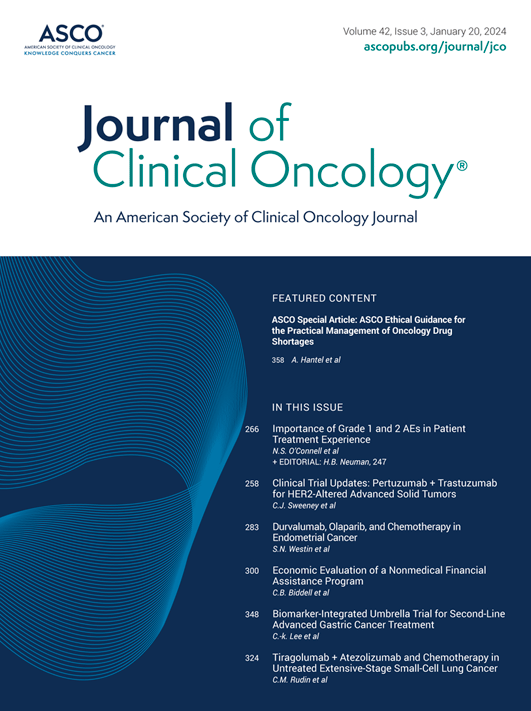The efficacy of PD-1 antibody sintilimab on ground glass opacity lesions in patients with early-stage multiple primary lung cancer (CCTC-1901, NCT04026841).
IF 42.1
1区 医学
Q1 ONCOLOGY
引用次数: 2
Abstract
8545 Background: Immune checkpoint inhibitors (ICIs) targeting programmed cell death protein 1 (PD-1) have been proven its significant efficacy on advanced non-small cell lung cancer (NSCLC). However, it remains unknown and is of great interest whether the PD-1 antibody affects early-stage lung cancer. Here, we reported the preliminary efficacy and safety outcomes of sintilimab on these early-stage GGO lesions in patients (pts) with multiple primary lung cancer in the CCTC-1901 study, the first trial evaluating PD-1 antibody in preinvasive or low invasive lung cancer worldwide. Methods: This single-center, phase II, Simon's two-stage design trial included pts who had a pathological diagnosis of resected lung cancer and at least one unresectable GGO lesion suspicious malignant which evaluated by a multidisciplinary team's consensus. The enrolled pts received 4 cycles of intravenous sintilimab 200 mg every 3 weeks. The primary endpoint is the objective response rate (ORR) of unresectable GGO lesions. For persistent GGO lesions that did not respond to treatment, either observation or second operation was taken. Also, immune biomarkers (T/B/NK subpopulation etc.) were monitored during treatment to validate the immune activity. Results: A total of 36 pts were included, with median age 59.5 (53.5-69), 66.7% females, 80.6% never smokers. All resected lesions were adenocarcinomas, of which 52.8% were EGFR mutated. 49 unresected GGOs (pure 11[22.4%], mixed 38[77.6%]) were defined as target lesions from 36 enrolled pts, with a mean size of 13.20±5.06 mm. The ORR (RECIST v1.1) was 5.6% (2/36, 1 PR and 1 CR); none of the pts had PD. Additionally, 3 non-target lesions (unresected solid lesions) from 3 included pts showed PR after the treatment of sintilimab, and the rest lesions (target or non-target) of 31 pts performed SD. Grade 1-2 fatigue (13, 36%), rash (13, 36%) and arthralgia (8, 22%) were the most common treatment-related adverse events (TrAEs), and no grade 3-5 TrAEs occurred. The proportion of CD8+ T-cell and the ratio of CD8+/CD4+ in 5 patients who showed PR of unresected lesions were significantly higher compared to those with SD lesions at baseline (CD8+ 36.6% vs 24.6%, p < 0.01; CD8+/CD4+ 1.09±0.18 vs 0.64±0.22, p < 0.01). Conclusions: This study is the first to confirm that PD-1 antibody sintilimab has immune-related antitumor activity on GGO-featured lung cancer and could be well tolerated among pts with early-stage lung cancer. Clinical trial information: NCT04026841.PD-1抗体辛替单抗治疗早期多发性原发性肺癌磨玻璃混浊病变的疗效观察
8545背景:靶向程序性细胞死亡蛋白1(PD-1)的免疫检查点抑制剂(ICIs)已被证明对晚期癌症(NSCLC)具有显著疗效。然而,PD-1抗体是否影响早期癌症仍然是未知的,也是非常令人感兴趣的。在此,我们在CCTC-1901研究中报道了新替利单抗对多发原发性癌症患者早期GGO病变的初步疗效和安全性结果,CCTC-19901研究是全球首次评估PD-1抗体在侵袭前或低侵袭性癌症中的作用。方法:这项单中心、II期、Simon的两阶段设计试验包括病理诊断为切除的癌症和至少一个经多学科团队共识评估的不可切除GGO可疑恶性病变的患者。入选的患者每3周接受4个周期的200 mg新替利单抗静脉注射。主要终点是不可切除GGO病变的客观有效率(ORR)。对于治疗无效的持续性GGO病变,采取观察或第二次手术。此外,在治疗期间监测免疫生物标志物(T/B/NK亚群等),以验证免疫活性。结果:共纳入36例患者,中位年龄59.5岁(53.5-69岁),女性66.7%,从不吸烟者80.6%。所有切除的病变均为腺癌,其中52.8%为EGFR突变。来自36例入选患者的49例未切除GGO(纯11例[22.4%],混合38例[77.6%])被定义为靶病变,平均大小为13.20±5.06mm。ORR(RECIST v1.1)为5.6%(2/36,1 PR和1 CR);没有一例患者患有PD。此外,3例纳入的患者中有3例非靶向病变(未切除的实体病变)在接受辛蒂利单抗治疗后显示PR,31例患者的其余病变(靶向或非靶向)表现为SD。1-2级疲劳(13.36%)、皮疹(13.56%)和关节痛(8.22%)是最常见的治疗相关不良事件(TrAE),未发生3-5级TrAE。5例未切除病变PR患者的CD8+T细胞比例和CD8+/CD4+比例在基线时显著高于SD病变患者(CD8+36.6%vs 24.6%,p<0.01;CD8+/CD4+1.09±0.18vs 0.64±0.22,p<0.01)癌症,在早期癌症患者中可以很好地耐受。临床试验信息:NCT04026841。
本文章由计算机程序翻译,如有差异,请以英文原文为准。
求助全文
约1分钟内获得全文
求助全文
来源期刊

Journal of Clinical Oncology
医学-肿瘤学
CiteScore
41.20
自引率
2.20%
发文量
8215
审稿时长
2 months
期刊介绍:
The Journal of Clinical Oncology serves its readers as the single most credible, authoritative resource for disseminating significant clinical oncology research. In print and in electronic format, JCO strives to publish the highest quality articles dedicated to clinical research. Original Reports remain the focus of JCO, but this scientific communication is enhanced by appropriately selected Editorials, Commentaries, Reviews, and other work that relate to the care of patients with cancer.
 求助内容:
求助内容: 应助结果提醒方式:
应助结果提醒方式:


